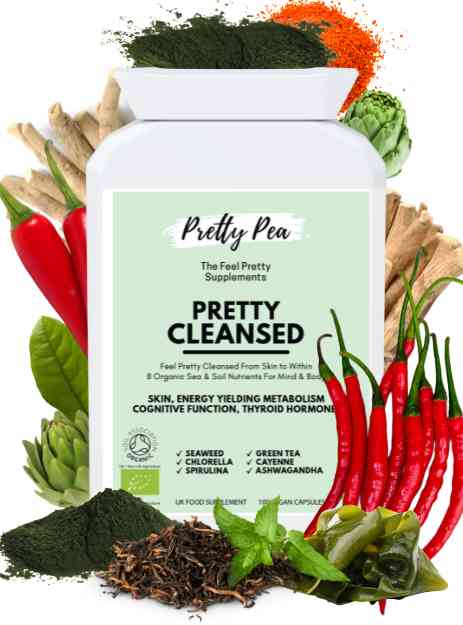
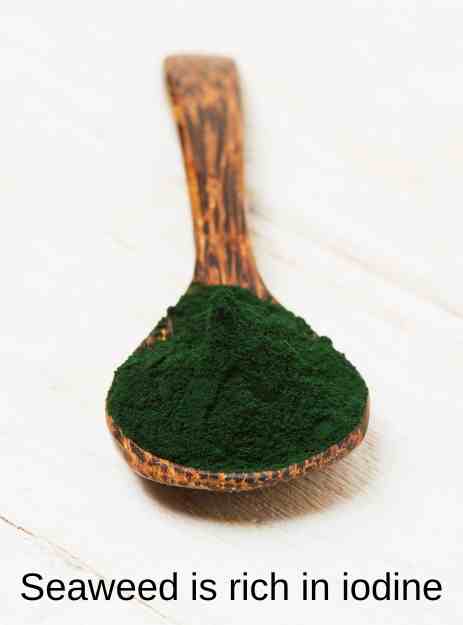
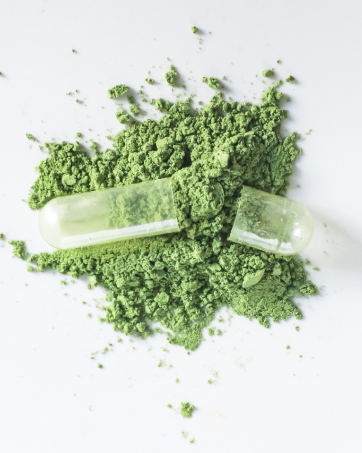
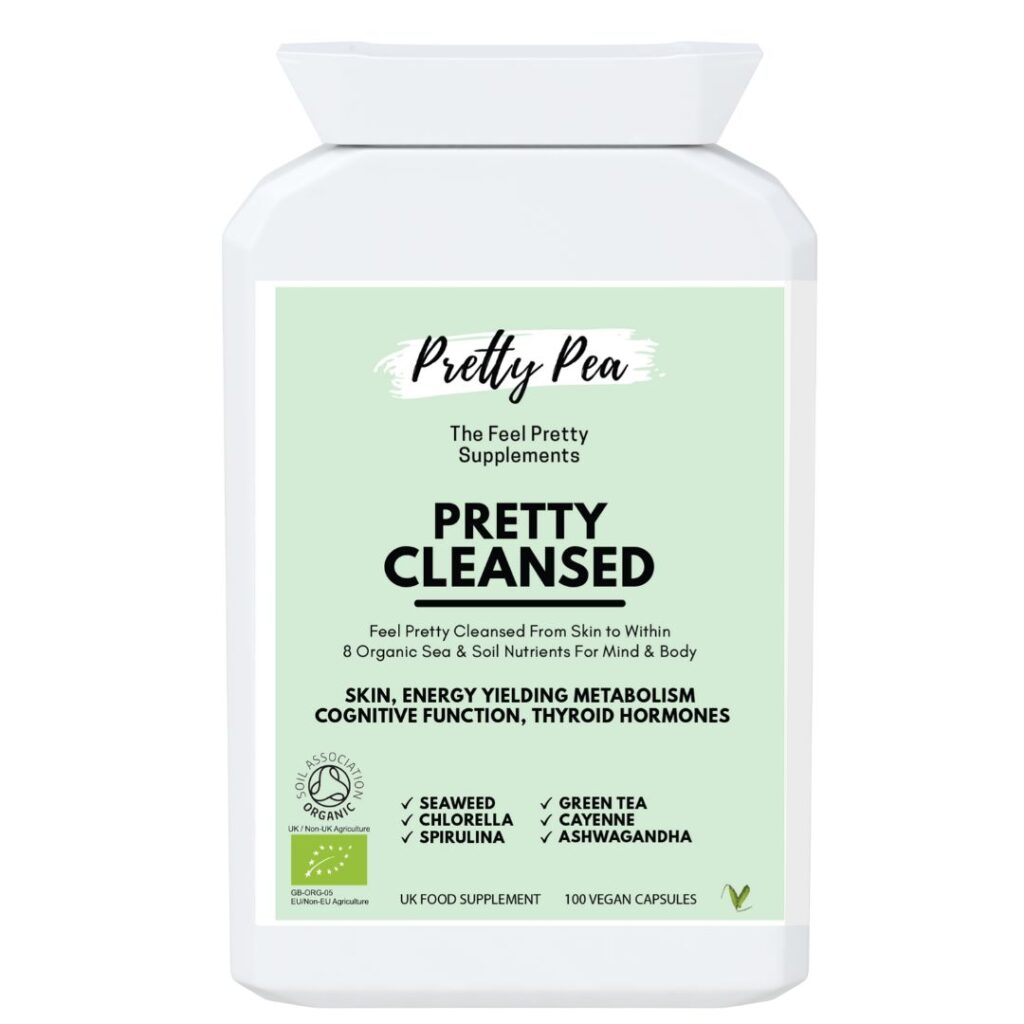
Pretty Cleansed Seaweed Supplement
PRETTY CLEANSED FROM WITHIN SEAWEED SUPPLEMENT
£25.99
Iodine Rich Organic Seaweed Supplement plus 6 of the most Nutrient Dense Functional Foods on the Planet to contribute to normal:
Maintaining Healthy Skin
Cognitive Function
Nervous System
Energy-yielding Metabolism
Thyroid Hormones
Sea Nutrients Organic Spirulina, Chlorella & Seaweeds
Soil Nutrients Organic Green Tea, Cayenne & Ashwagandha
Plus Liver-Loving Organic Artichoke
I have been taking these for over 2 years now and notice a real difference when I go without. It really helped me with my bloating, especially in a sedentary office job. I feel like I digest food better and my metabolism has recovered. Love these and I recommend them to my friends and family
Katy H
/
28th July 2024


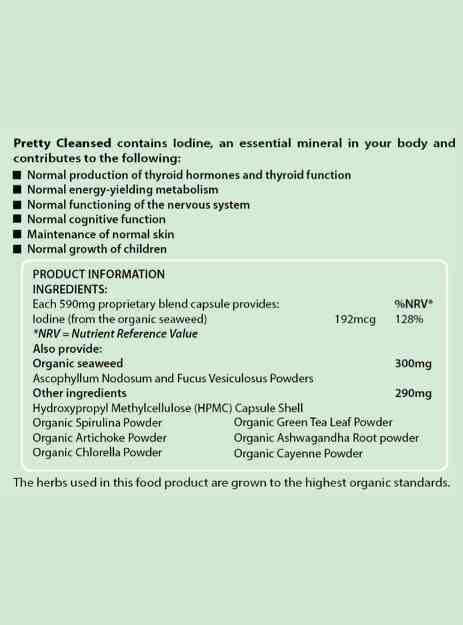
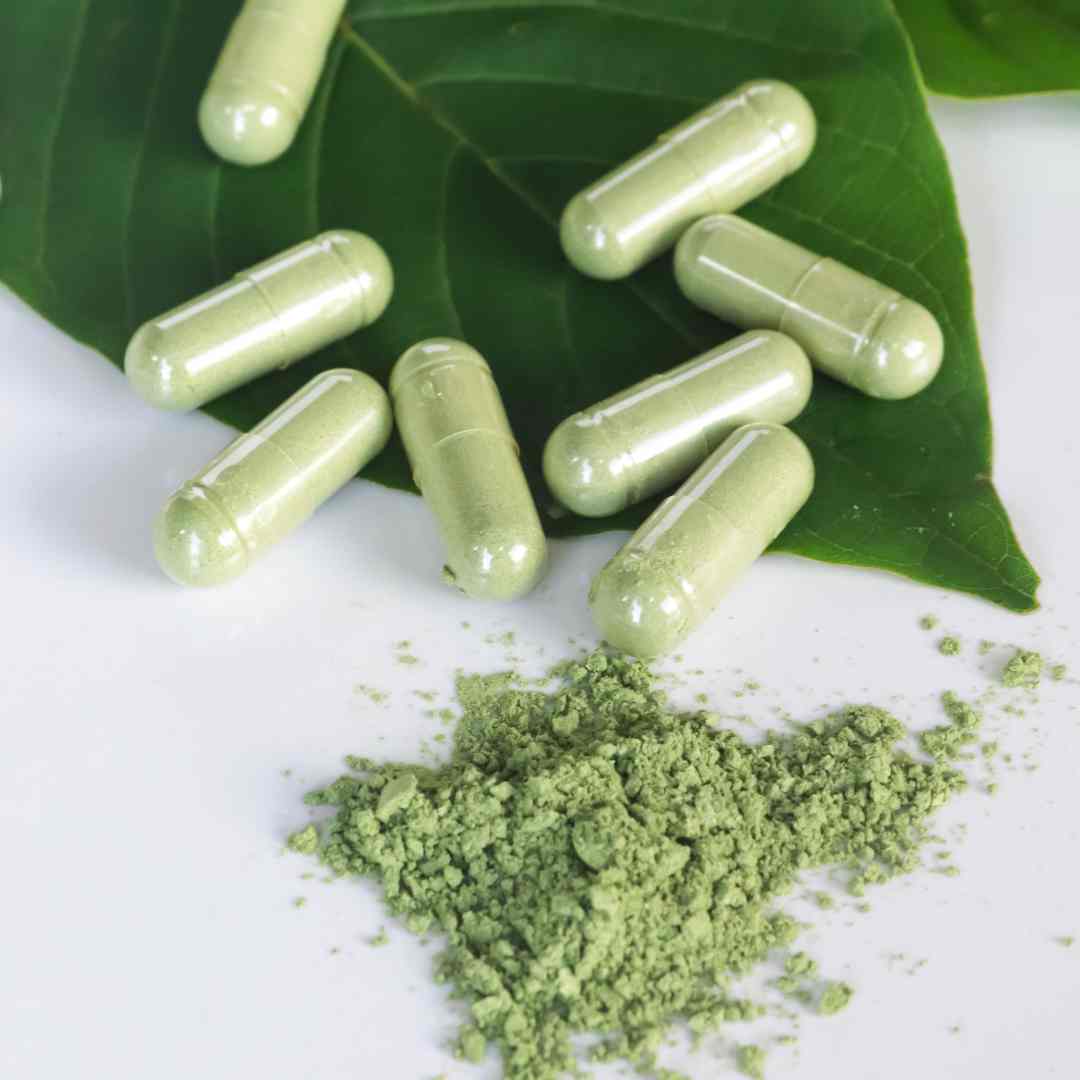
FEELING PRETTY CLEANSED STARTS FROM WITHIN
Cellular Cleansing From Within – with Sea & Soil Goodness!

Thyroid Metabolism
Contributes to normal production of Thyroid Hormones & Thyroid Function

Cognitive Function
Contributes to normal Cognitive Function

Pretty Skin From Within
Contributes to the maintenance of normal Skin

Sea & Soil Nutrients
Green Tea, Cayenne, Spirulina, Chlorella, Ashwagandha & Artichoke
Pretty Cleansed Benefits
Benefits
+
Pretty Cleansed combines some of the most nutrient-dense organic ingredients on the planet. Nutrients from the earth’s soils and planets’ seas that powerfully alkalize, cleanse & detox your body, with heavy metal cleaning of the system.
These supercharged organic seaweed tablets combine Spirulina, Chlorella, Green Tea, Ashwagandha, Cayenne and Artichoke to provide nourishment and metabolic support.
Pretty Cleansed is packed full of iodine rich seaweeds to support the production of thyroid hormone and maintain your metabolism.
This seaweed supplement is also high in a broad spectrum of protective nutrients, including antioxidants, phyto-chemicals, polyphenols, enzymes, amino acids, vitamins and minerals.
How many servings
+
Contains 100 Organic Easy Take Vegan Capsules.
How to use
+
Take 1 capsule, 1 to 3 times per day or as advised by your healthcare provider
What’s Inside?
Organic Iodine
+
Iodine can be found in shellfish and dairy, with seaweed being one of the absolute best natural sources.
It’s been known since 2011 that the UK population is mildly iodine deficient.
With the UK now ranking seventh among the ten most iodine-deficient nations in the world, and one of only two high-income countries on the list.
In adults, iodine is important for thyroid function and a healthy metabolism.
Iodine deficiency is a particular issue during pregnancy and lactation, when the body’s demand for iodine escalates. Lack of iodine causes not only goitre, but also mental deficiency, hearing loss and other neurological impairments, plus short stature due to thyroid insufficiency during fetal development and childhood.
Iodine contributes to normal:
Cognitive function
Energy-yielding metabolism
Functioning of the nervous system
Maintenance of normal skin
Production of thyroid hormones & thyroid function
Growth of children
Organic Spirulina
+
Spirulina, a blue-green micro-algae, is a highly nutritious functional food with many potential health benefits.
With a rich content of protein, polysaccharide, lipid, essential amino and fatty acids, dietary minerals and vitamins Spirulina has several pharmacological activities such as:
Antimicrobial (including antiviral and antibacterial)
Anticancer
Metalloprotective (prevention of heavy-metal poisoning against Cd, Pb, Fe, Hg)
Immunostimulant
Antioxidant
Spirulina’s Nutritional Profile
High in protein, 100g of Spirulina yields 50-70% protein.
It contains 18 amino acids (protein building blocks), including 8 essential amino acids which the body cannot produce from its own resources and have to be replaced daily by food.
Spirulina is also rich in beta-carotene, vitamin E, vitamin F factor (GLA), vitamins and minerals including iron.
Its exceptional levels of vitamin B12 is of special interest to vegans, vegetarians and non-meat eaters who have potential to be deficient in this important vitamin.
Spirulina’s Potential..
Numerous in vivo evidence supports Spirulina’s potential for brain health with antioxidant, anti-inflammatory, and neuroprotective mechanisms.
Preliminary clinical studies have also suggested that Spirulina can help to reduce mental fatigue.
There is also evidence of spirulina on appetite regulation.
Organic Chlorella
+
Chlorella is an edible, single-cell marine algae. Also known as sea-moss or sea lettuce it has biological and pharmacological properties important for human health.
Chlorella provides useful detoxification support because it can bind with heavy metals and pesticides (such as PCBs), that can accumulate in the body.
Studies have found that Chlorella may increase collagen production in the skin, making it ideal for anti-aging and wound-healing.
Rich in fibre it also supports healthy digestion and overall digestive tract health.
Nutrient Rich Functional Food
Chlorella has a long history of use as a food source and contains a unique and diverse composition of functional macro- and micro-nutrients including:
Proteins, omega-3 polyunsaturated fatty acids, polysaccharides, vitamins and minerals.
Beta-carotene and 19 amino acids (including the 8 essential amino acids).
Vitamins include D and B12, that are absent in plant-derived food sources. It contains even more vitamin B12 than liver.
Chlorella contains larger amounts of folate and iron than other plant-derived foods.
Chlorella contains more chlorophyll than many known foods.
It’s also a rich source of calcium, iron, selenium and zinc.
Chlorella supplementation has been reported to exhibit various pharmacological activities, including:
Immunomodulatory
Antioxidant
Antidiabetic
Antihypertensive
Antihyperlipidemic
Organic Green Tea
+
Green tea has multiple pharmacologically active components including polyphenols, alkaloids, amino acids, polysaccharides, and volatile components.
Green tea’s main antioxidant agents are polyphenol catechins, they include: epicatechin, epigallocatechin, epicatechin gallate and epigallocatechin gallate (EGCG).
Epigallocatechingallate (EGCG), in particular, has the most potent anti-inflammatory and anticancer potential and is also a powerful antioxidant.
Some studies have shown green tea polyphenols to have a stronger antioxidant action than vitamin C and vitamin E – two of the most powerful antioxidants.
Green tea polyphenols have also been documented for their anti-inflammation, anti-cancer, anti-cardiovascular, anti-microbial, anti-hyperglycemic, and anti-obesity properties.
Green Tea and Weight Loss
The active components of green tea associated with weight loss are caffeine and catechins, primarily epigallocatechin gallate (EGCG), which is a flavonoid.
Results from a number of randomized, controlled intervention trials have shown that consumption of GTC (270 mg to 1200 mg/day) may reduce body weight and fat.
(A typical brewed cup of green tea has about 240–320 mg catechins and 45 mg caffeine)
Green tea catechins (GTC) may influence body weight and composition by:
Increased thermogenesis / energy expenditure
Increased fat oxidation
Reduced lipogenesis
Reduced fat absorption
Organic Ashwagandha
+
Ashwagandha, Withania somnifera (WS), is one of the most powerful herbs in Ayurvedic healing. It has been used since ancient times for a wide variety of conditions, and is most well-known for its restorative benefits.
Ashwagandha’s extracts have been used in traditional medicine for millennia to promote healthy aging and wellbeing.
It has been used in the treatment of various illnesses in Indian Systems of Medicine for over 3,000 years. In Ayurveda it is classified as a rasayana (a way of attaining excellence) and purported to promote mental and physical wellbeing, rejuvenate the body and increase longevity.
In Sanskrit, ashwagandha means “the smell of a horse,” indicating that the herb imparts the vigour and strength of a stallion, and has traditionally been prescribed to help people strengthen their immune system after an illness.
Traditionally, Ashwagandha is used to promote strength, endurance, youthful vigour and health; it nurtures the time elements of the body; and increases the production of vital fluids such as blood, lymph, and semen.
Ashwagandha comprises a broad range of phytochemicals, including steroidal lactones and alkaloids that have a wide range of biological effects.
In pre-clinical studies, ashwagandha and its components have been shown to be anti-inflammatory, anti-cancer, anti-stress, immunomodulatory, antioxidant, anti-stress / adaptogenic, neuro-protective and endocrinological activities.
Ashwagandha is now widely used in Western countries as a nutritional supplement.
Organic Cayenne
+
Cayenne (Capsicum minimum) also known as red pepper and chillies are regarded by herbalists as the purest and safest stimulating herb known, opening up tissues in the body to an increased blood flow.
Cayenne produces natural warmth, and often used by people with poor circulation and low energy levels.
It is also an iron-bearer, which accelerates the oxygenation of cells, along with an antiseptic, anti-spasmodic and carminative.
It also widely used to support digestion, reduce wind and
promote gastro-intestinal secretions.
Organic Artichoke
Artichokes, (Cynara scolymus L.) with its hepatoprotective properties has traditionally been used in herbal treatments to promote a healthy liver and efficient digestive system.
Lifestyle has a significant impact on the functioning of the liver including: alcohol consumption, diet with high fats ingredients and prooxidative substances and synthetic drugs.
Over 50 years ago, Japanese researchers found that artichokes can boost the production of bile by the liver, which can in turn break down fat.
Artichoke has since undergone extensive biomedical herbal remedy research. Specifically, antioxidant, choleretic, hepatoprotective, bile-enhancing and lipid-lowering effects have been demonstrated, which corresponded with its historical use.
Artichoke is rich in polyphenols, flavonoids, anthocyanins, phenolic compounds, inulin, coumarins, terpenes, dietary fibre, enzymes, polysaccharides, minerals and vitamins.
One of the primary active constituents in artichoke is cynarin.
Cynarin is the close botanical cousin of the herb milk thistle and is popular support.
Safety & Contraindications
Results may vary from person to person.
Store in a cool dry place, out of the reach of children.
Best before date: see base of container.
Caution: Do not exceed the recommended daily intake.
A food supplement should not be used as a substitute for a varied, balanced diet and healthy lifestyle. Always consult your GP before taking food supplements if you are taking medication or have an existing medical condition.
If you feel unwell, stop taking this product immediately and seek medical advice.
References
Iodine deficiency in the UK: grabbing the low-hanging fruit – The Lancet Diabetes & Endocrinology
Medicina | Free Full-Text | Nutritional Supplements for Skin Health—A Review of What Should Be Chosen and Why (mdpi.com)
Development of Databases on Iodine in Foods and Dietary Supplements – PubMed (nih.gov)
Iodine deficiency in Europe and its consequences: an update – PubMed (nih.gov)
Iodine deficiency disorders in Europe – PubMed (nih.gov)
Iodine related health claims | EFSA (europa.eu)
Iodine and the growth of children | EFSA (europa.eu)
www.efsa.europa.eu/en/efsajournal/pub/1756
Pharmacological Studies of Artichoke Leaf Extract and Their Health Benefits – PubMed (nih.gov)
Bioactive Compounds from Artichoke and Application Potential – PubMed (nih.gov)
Biological Properties, Bioactive Constituents, and Pharmacokinetics of Some Capsicum spp. and Capsaicinoids – PubMed (nih.gov)
Biological Activities of Red Pepper (Capsicum annuum) and Its Pungent Principle Capsaicin: A Review – PubMed (nih.gov)
Capsaicin and Its Effects on Body Weight – PubMed (nih.gov)
Effects of Withania somnifera (Ashwagandha) and Terminalia arjuna (Arjuna) on physical performance and cardiorespiratory endurance in healthy young adults – PubMed (nih.gov)
An investigation into the stress-relieving and pharmacological actions of an ashwagandha (Withania somnifera) extract – PMC (nih.gov)
An Alternative Treatment for Anxiety: A Systematic Review of Human Trial Results Reported for the Ayurvedic Herb Ashwagandha (Withania somnifera) – PMC (nih.gov) www.ncbi.nlm.nih.gov/pmc/articles/PMC4270108/
Withania Somnifera (Ashwagandha) and Withaferin A: Potential in Integrative Oncology – PMC (nih.gov) www.ncbi.nlm.nih.gov/pmc/articles/PMC6862083/
Natural Withanolides in the Treatment of Chronic Diseases – PMC (nih.gov)
Green Tea (Camellia sinensis): A Review of Its Phytochemistry, Pharmacology, and Toxicology – PubMed (nih.gov)
The effects of green tea on weight loss and weight maintenance: a meta-analysis – PubMed (nih.gov)
Antiobesity effects of green tea catechins: a mechanistic review – PubMed (nih.gov)
Hursel R, Westerterp-Plantenga MS. Catechin- and caffeine-rich teas for control of body weight in humans. Am J Clin Nutr 2013;98:1682S-93S. [PubMed abstract]
Rains TM, Agarwal S, Maki KC. Antiobesity effects of green tea catechins: a mechanistic review. J Nutr Biochem 2011;22:1-7. [PubMed abstract]
Janssens PL, Hursel R, Westerterp-Plantenga MS. Nutraceuticals for body-weight management: The role of green tea catechins. Physiol Behav 2016;162:83-7. [PubMed abstract]
Turkozu D, Tek NA. A minireview of effects of green tea on energy expenditure. Crit Rev Food Sci Nutr 2017;57:254-8. [PubMed abstract]
Lochocka K, Bajerska J, Glapa A, Fidler-Witon E, Nowak JK, Szczapa T, et al. Green tea extract decreases starch digestion and absorption from a test meal in humans: a randomized, placebo-controlled crossover study. Sci Rep 2015;5:12015. [PubMed abstract]
Lonac MC, Richards JC, Schweder MM, Johnson TK, Bell C. Influence of short-term consumption of the caffeine-free, epigallocatechin-3-gallate supplement, Teavigo, on resting metabolism and the thermic effect of feeding. Obesity (Silver Spring) 2011;19:298-304. [PubMed abstract]
Mielgo-Ayuso J, Barrenechea L, Alcorta P, Larrarte E, Margareto J, Labayen I. Effects of dietary supplementation with epigallocatechin-3-gallate on weight loss, energy homeostasis, cardiometabolic risk factors and liver function in obese women: randomised, double-blind, placebo-controlled clinical trial. Br J Nutr 2014;111:1263-71. [PubMed abstract]
Jurgens TM, Whelan AM, Killian L, Doucette S, Kirk S, Foy E. Green tea for weight loss and weight maintenance in overweight or obese adults. Cochrane Database Syst Rev 2012;12:CD008650. [PubMed abstract]
Phung OJ, Baker WL, Matthews LJ, Lanosa M, Thorne A, Coleman CI. Effect of green tea catechins with or without caffeine on anthropometric measures: a systematic review and meta-analysis. Am J Clin Nutr 2010;91:73-81. [PubMed abstract]
Dostal AM, Samavat H, Espejo L, Arikawa AY, Stendell-Hollis NR, Kurzer MS. Green tea extract and catechol-O-methyltransferase genotype modify fasting serum insulin and plasma adiponectin concentrations in a randomized controlled trial of overweight and obese postmenopausal women. J Nutr 2016;146:38-45. [PubMed abstract]
Hursel R, Viechtbauer W, Westerterp-Plantenga MS. The effects of green tea on weight loss and weight maintenance: a meta-analysis. Int J Obes (Lond) 2009;33:956-61. [PubMed abstract]
EFSA Panel on Dietetic Products, Nutrition and Allergies (NDA). Scientific opinion on the substantiation of health claims related to Camellia sinensis (L.) kuntze (tea), including catechins from green tea, and contribution to the maintenance or achievement of a normal body weight (ID 1107, 1112, 1544, 2716), increased beta-oxidation of fatty acids leading to a reduction in body fat mass (ID 1123, 1124, 3698), and maintenance of normal blood glucose concentrations (ID 1115, 1545) pursuant to Article 13(1) of Regulation (EC) No 1924/2006. EFSA Journal 2010;8:1791-812.
Chlorella vulgaris: A Multifunctional Dietary Supplement with Diverse Medicinal Properties – PubMed (nih.gov)
Potential of Chlorella as a Dietary Supplement to Promote Human Health – PubMed (nih.gov)
Spirulina for the food and functional food industries – PubMed (nih.gov)
Nutritional and medical applications of spirulina microalgae – PubMed (nih.gov)
Spirulina Microalgae and Brain Health: A Scoping Review of Experimental and Clinical Evidence – PubMed (nih.gov)